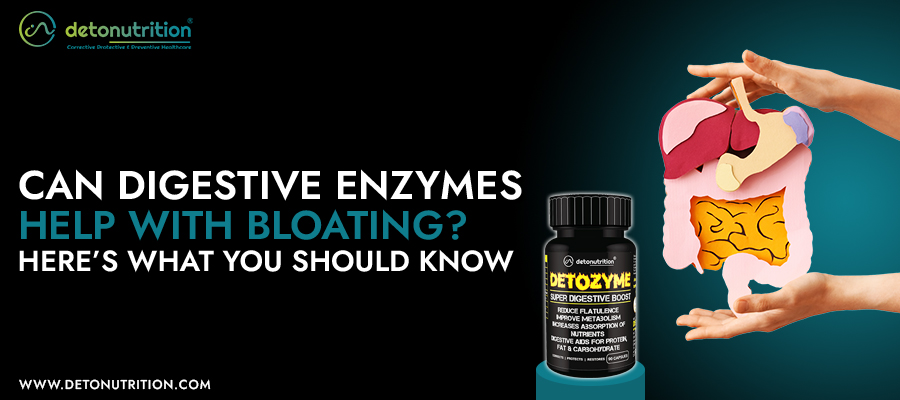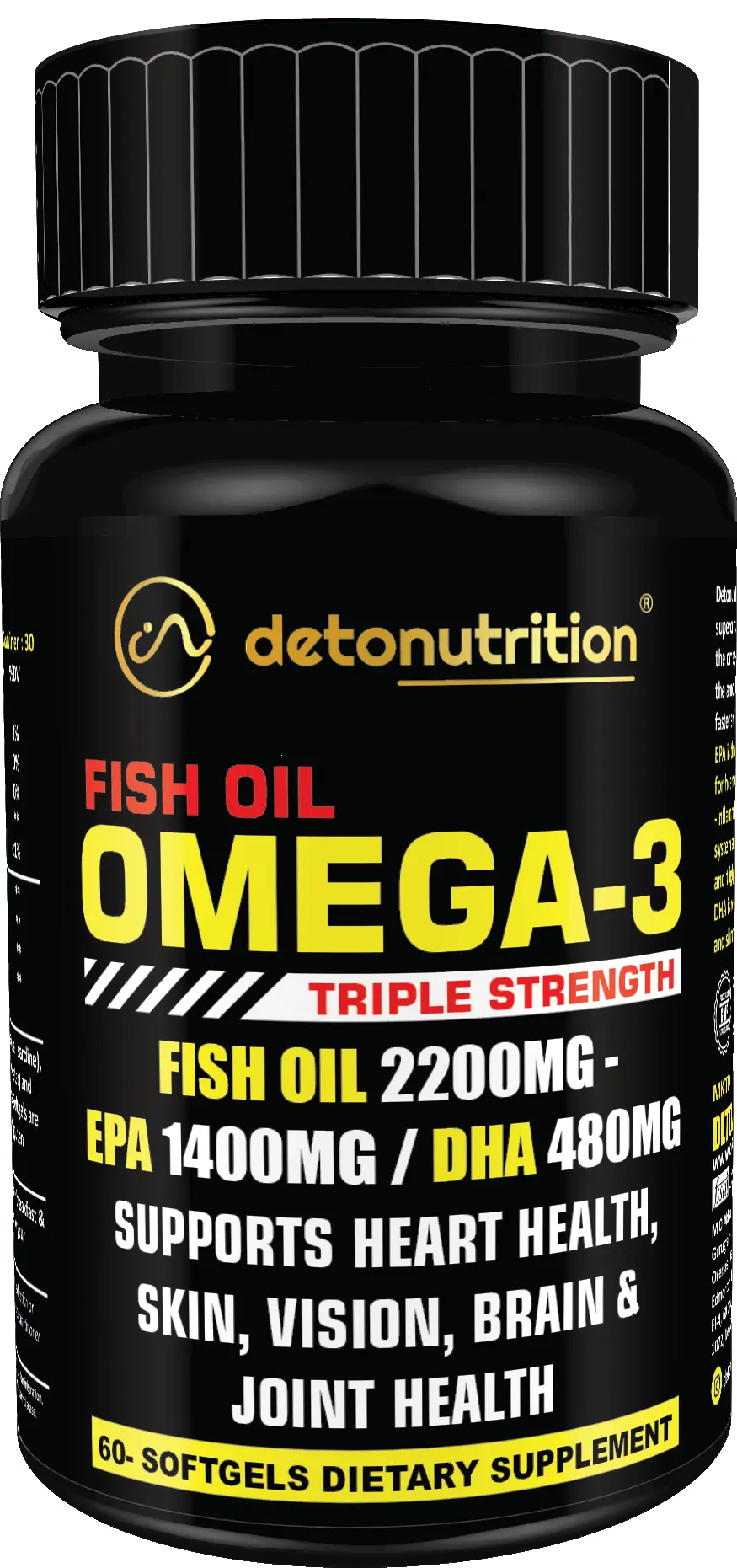Can Digestive Enzymes Help With Bloating? Here’s What You Should Know
If you are reading this, you are likely to know that uncomfortable, heavy feeling after eating a meal. Maybe your stomach feels tight, your jeans suddenly feel too snug, or you can’t stop burping. Bloating is one of the most common digestive issues that people in India experience, especially with our rich and spicy diets. From dal makhani and paneer to deep-fried snacks, our taste buds may be happy, but our gut sometimes struggles to keep up.
If you’ve been dealing with this often, you might have come across the term digestive enzymes. These are believed to help with bloating, indigestion, and even fatigue after meals. Continue reading to get guidance on how to choose the best digestive enzymes for your needs.
Why Bloating Happens?
Before we jump into how digestive enzymes help, let’s understand bloating a little better.
Bloating occurs when your digestive system struggles to process what you’ve eaten. This can happen for several reasons:
- Overeating or eating too fast
- Consuming high-fat or spicy foods
- Low fiber or enzyme deficiency
- Intolerance to certain foods like dairy or gluten
- Gut imbalance or weak digestion
In India, our meals often include a mix of complex carbs, dairy, and spices — all of which can be hard to digest, especially when eaten together in large portions. Add stress and irregular eating habits to the mix, and you have a perfect recipe for digestive distress.
How Digestive Enzymes Can Help With Bloating?
Here’s where the best digestive enzymes can make a real difference. When your body doesn’t produce enough enzymes naturally, supplementing with a digestive enzyme blend can help your system break down food more efficiently.
Let’s look at how this helps reduce bloating:
1. Better Breakdown of Food
Enzymes ensure that the carbohydrates, proteins, and fats in your food are fully digested. When your stomach isn’t struggling with undigested food, you’re less likely to experience gas and bloating.
2. Reduced Gas Formation
When food isn’t properly digested, it ferments in the gut, leading to gas. Digestive enzymes help minimize this fermentation process, reducing both gas and that bloated feeling.
3. Improved Nutrient Absorption
Proper digestion allows your body to absorb more nutrients — meaning you feel more energetic and less sluggish after meals.
4. Support for Dairy and Gluten Sensitivities
If you’re someone who often feels bloated after having milk or chapati, you might have mild lactose or gluten sensitivity. The best digestive enzymes often include lactase and other specific enzymes that help with these food components.
5. Balanced Gut Function
Regular use of digestive enzymes can support overall gut health by ensuring that your digestive system isn’t overworked. When your gut is healthy, bloating becomes much less frequent.
Signs You Might Need Digestive Enzyme Support
You might consider adding digestive enzymes to your routine if you often experience:
- Frequent bloating or stomach distension
- Gas or belching after meals
- A heavy feeling in your stomach
- Fatigue after eating
- Constipation or irregular bowel movements
If these sound familiar, your body may be struggling with enzyme deficiency — and supplementing with Detozyme Capsules, the best digestive enzymes could help restore balance.
Ingredients of the Best Digestive Enzymes
Not all enzyme supplements are created equal. But Detonutrition’s Detozyme Capsules include the below power herbs that make it the best digestive enzymes that are actually effective:
1. Cumin
Jeera or Cumin, commonly found in Indian kitchens, has a long traditional use for aiding digestion. It stimulates the production of digestive enzymes and bile in the gut which can help break down food more efficiently.
2. Fennel
Remember eating Saunf or Fennel seeds after a hearty meal at a restaurant? It is because it helps to relax gastrointestinal spasms, reduce gas and support the breakdown of carbs and fibre. That means less fermentation and bloating from undigested carbs.
3. Ajwain/Carom seeds
Used in Indian kitchens for years as a digestive aid, ajwain helps reduce gas, belching and the feeling of heaviness post-meal.
4. Ginger
If your diet is rich in protein, improved protein digestion means fewer undigested residues causing discomfort. Protein digestion requires strong enzyme activity that is where ginger comes from. It helps to stimulate stomach acid and digestive enzyme secretion, which supports better breakdown of proteins (like dals, paneer, meats).
5. Curcuma longa (Turmeric)
Haldi or Turmeric has anti-inflammatory properties and supports digestive enzyme function as well as maintaining healthy gut lining. It is particularly useful when meals are spicy or when you have occasional gut irritation when turmeric supports both digestion and comfort.
In addition to the above herbs, Detozyme also includes Black Pepper, which enhances the bioavailability of several nutrients and other herbal compounds. This is less about “digestion” directly and more about “getting the benefits” from your food once digested.
Final Thoughts
Bloating may seem like a minor inconvenience, but if it’s happening often, it’s a sign that your digestive system needs a little extra care and attention. Digestive enzymes can be a simple yet powerful way to support your gut health, improve digestion, and feel lighter after meals.
By choosing Detonutrition’s Detozyme Capsules, the best digestive enzymes along with making mindful food choices, you can finally say goodbye to that post-meal discomfort and enjoy your food the way it’s meant to be enjoyed — without the bloat.

We have a vision to take good care of your health and nutrition with products which are made from research and experience. Our team is technical as well as experienced so that we can deliver you the best products for your health and wellness.
Stay Fit, Stay Healthy And Stay Happy Always!
QUICK LINKS
CATEGORIES
Subscribe Us
Subscribe to Dr. Aaditya's Health Blog Email Newsletter
© Copyright - Detonutrition. All Right Reserved 2026.




